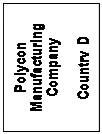
CATEGORIES:
BiologyChemistryConstructionCultureEcologyEconomyElectronicsFinanceGeographyHistoryInformaticsLawMathematicsMechanicsMedicineOtherPedagogyPhilosophyPhysicsPolicyPsychologySociologySportTourism
Ultimate parent company considerations















"The tax practitioner acting for Polycon Lens Company would at all times be concerned about Polycon Lens Company's tax liability when dividends flow through the group, when capital gains are made on sales of investments, or where losses are being made which could possibly be relieved against taxable profits earned elsewhere in the group. All the tax advice given to Mr Holmes to date may prove ineffective if the affairs of the group are not co-ordinated by the international tax consultant who is aware of the tax reasons for forming all of the above companies, and the effect that one country's tax legislation has on another company within the group, and ultimately the parent company, Polycon Lens Company."
The above advertisement for the international tax consultant may be forgiven if one realises that without someone to co-ordinate the tax affairs of the entire group, the affairs of each company within the group are being looked after by local experts who are nevertheless ignorant of the group's overall requirements. Some of the questions, which may be answerable only by the overall tax co-ordinator, are mentioned below:
(a) Differing rates of corporate tax may well apply to taxable profits earned by the various companies within the group, and, subject to acceptable arms-Iength pricing considerations, the prices of products and fees for services, interest and royalty payments, etc, should reflect the intention of earning maximum profits where taxes are the lowest.
(b) Many countries allow companies with small profits to benefit from lower rates of corporate tax. A waiver of certain charges or a re-adjustment of certain prices may enable a group company to take advantage of such lower rates for a particular year.
(c) The timing of dividend declarations and overseas remittances may be vital in maintaining such lower rates of corporate tax, or absorbing otherwise unrelievable losses.
(d) It may be possible to claim certain concessions and allowances in a particular tax jurisdiction, which will create a taxable loss, which may then be carried back to recoup past corporate tax payable. Inter-company adjustments may be necessary to achieve such tax refunds.
(e) The transfer of fiscal residency of a loss-making overseas subsidiary to a profitable subsidiary company or parent company may be considered by the overall tax consultant, but is not normally an acceptable tax planning technique, since transfers of residence cannot be made at will if the overseas subsidiary becomes profitable again.
(f) The domestic tax adviser of Polycon Lens Company, or any other company within the group which receives dividend income, may have to decide on whether it is more advantageous to claim credit of foreign taxes against domestic tax due on gross income, or whether to claim a deduction of foreign taxes against gross income so that the net income only is brought into charge for domestic tax purposes.
(g) The overall tax adviser should be involved in the finalisation of audited accounts of subsidiary companies within the group, so that he can be sure that the accounts prepared permit the maximum credit of foreign taxes against domestic tax payable on gross profits. He must also ensure that the accounts do not contain any irregularities, which, upon subsequent investigation of the group's affairs by any tax administration, show an unusual treatment of assets and income or liabilities and expenditure. It is always helpful to understand the various different factors considered by the tax administration when investigating the affairs of any company within the group, or Polycon Lens Company itself.
He may also advise the directors of a foreign subsidiary to declare dividend to its immediate parent company, if the parent is contemplating a sale of the shares in the subsidiary company. If the subsidiary company is located in a high tax jurisdiction, and the parent company is taxed on its income with a credit given for foreign taxes, then the dividend declaration may result in no additional tax being levied on the parent company; however, a sale of the shares (reflecting retained earnings) may be subject to a capital gains tax liability which does not take into consideration corporate tax levied on the retained earnings. Again, a similar decision may need to be made if it is the intention to liquidate a subsidiary company. Dividend declarations to the parent may similarly result in a reduction of the total taxes incurred.
Date: 2015-01-29; view: 1733
| <== previous page | | | next page ==> |
| Formation of tax haven entities | | | Simplification of word structure in Late PG. Role of stem-suffixes in the formation of declensions |